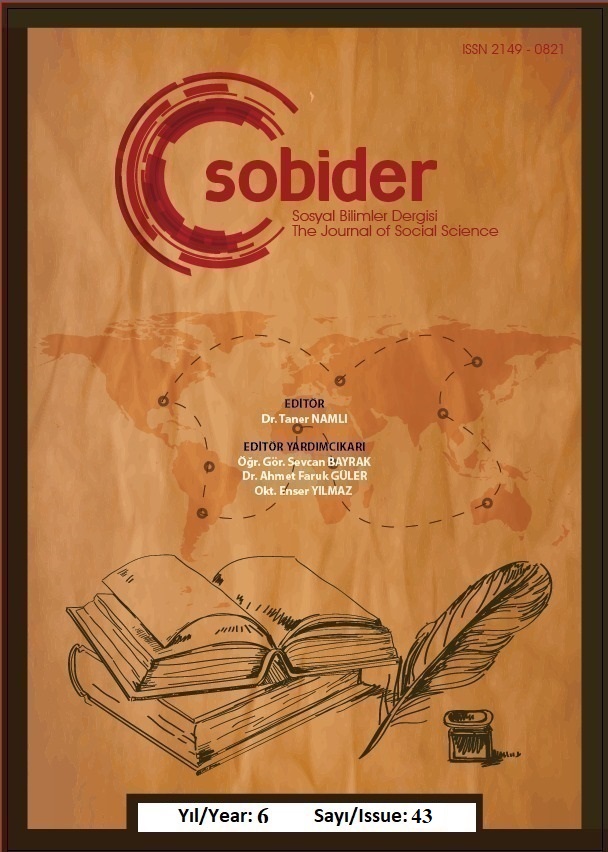Author :
Abstract
Halk bilimi geçmişten günümüze değin toplum ve edebiyatın ayrılmaz bir parçasıdır. Çağdaş yazarlarımız tarafından toplumdaki etkisi fark edilen ve çağdaş eserlerde daha fazla yer edinmeye başlayan halk bilimine son yıllarda verilen önem artmıştır. Yapılan bu çalışmada son dönem yazarlarından Özgür Bacaksız’ın “Mutsuz Çocuklar Ülkesi” adlı çocukluk ve gençlik dönemlerini anlattığı biyografi niteliğindeki romanında yer alan halk bilimi motifleri tespit edilmeye çalışılmıştır. Yazarın eseri üzerine halk bilimi açısından yapılan bu çalışmada verilerin toplanmasında nitel araştırma yöntemlerinden doküman inceleme metodu kullanılmıştır. Eserde halk bilimi açısından ön plana çıkan motifler alfabetik dizilime göre sıralanıp dikkate alınarak bulgular toplanmış ve değerlendirilmiştir. Bu motiflerle ilgili örnek cümlelerden bazıları eklenmiş olup unsurların tamamında yinelenen cümleler bulgular kısmına eklenmemiştir. Sonuç olarak ise eserin içerisinde barındırdığı 18 motif (akrabalık bağları, dua, meslekler, taşıtlar…) ile halkbilimi açısından yeterli olduğu ve sonucuna ulaşılmıştır.
Keywords
Abstract
Folklore is an integral part of society and literature from past to present. In recent years, the importance given to folklore, which has been recognized by our contemporary writers in society and has started to gain more place in contemporary works, has increased. In this study, it is tried to determine folklore motifs in the biography novel of one of the recent writers Özgür Bacaksız's childhood and youth periods called dönem The Country of Unhappy Children ”. In this study, which was conducted on the work of the author in terms of folklore, the document analysis method, which is one of the qualitative research methods, was used to collect the data. In the work, the motifs that come to the forefront in terms of folklore are sorted according to the alphabetical order and the findings are collected and evaluated. Some of the sample sentences related to these motifs have been added and not all of the elements have been added to the findings section. As a result, 18 motifs (kinship ties, prayer, professions, vehicles…) are sufficient in terms of folklore.
Keywords
- Aslan, E. (2003). Türk Halk Bilimi Araştırmaları. Diyarbakır: Dicle Üniversitesi Eğitim Fakültesi Yayınları.
- Bacaksız, Ö. (2015). Mutsuz Çocuklar Ülkesi. İstanbul: Destek Yayınları.
- Boratav, P. N. (1984). 100 Soruda Türk Folkloru. İstanbul: Gerçek Yayınevi.
- Duvarcı, A. (2005). Türklerde Tabiat Üstü Varlıklar ve Bunlarla İlgili Kabuller, İnanmalar, Uygulamalar. Bilig Dergisi, Sayı: 32. ss. 125-144.
- Günay, U. (1999). Osmanlı İmparatorluğu ve Türk Halk Kültürü. Osmanlı Kültür ve Sanat. Ankara: Yeni Türkiye Yayınları.
- Oğuz, M. Ö., Ekici, M. (2012). Türk Halk Edebiyatı El Kitabı. Ankara: Grafiker Yayınları.
- Ortakçı, A. (2012). Fakir Baykurt'un Romanlarında Halk Bilimi Unsurları. Ondokuz Mayıs Üniversitesi Sosyal Bilimler Enstitüsü Yayımlanmamış Yüksek Lisans Tezi, Samsun.
- Kavruk, H., Sönmez, H. (2010). Ahmed-i Dâ’i’nin Vasiyyet-Nâme-i Nûşirevân’ındaki Eğitici Değerler. Değerler Eğitimi Dergisi. 8(20), 171–199.
- Örnek, S. V. (2000). Türk Halk Bilimi. Ankara: Kültür Bakanlığı Yayınları.
- Sönmez, H. (2012). Rıfat Ilgaz’ın Çocuklarım Şiirinde Zaman Mekân Unsurları ve Çocuk Mekân Unsurları ve Çocuk İlişkisi Üzerinde İlişkisi Üzerinde Bir İnceleme. Türkiyat Araştırmaları Dergisi (Selçuk Üniversitesi). (32), 225–234.
- Sönmez, H. (2012). Rıfat Ilgaz’ın Şiirlerinde Çocuk. Akademik Bakış, (30), 1–20.
- Süleymanlı, M. (1990). Göç. Çev. Seyfettin Altaylı. İstanbul: Ötüken Yayınları.
- TDK, (2019). Türkçe Sözlük. Ankara: TDK Yayınları.
- Yıldırım, A. ve Şimşek, H. (2005). Sosyal Bilimlerde Nitel Araştırma Yöntemleri. Ankara: Seçki Yayıncılık.
